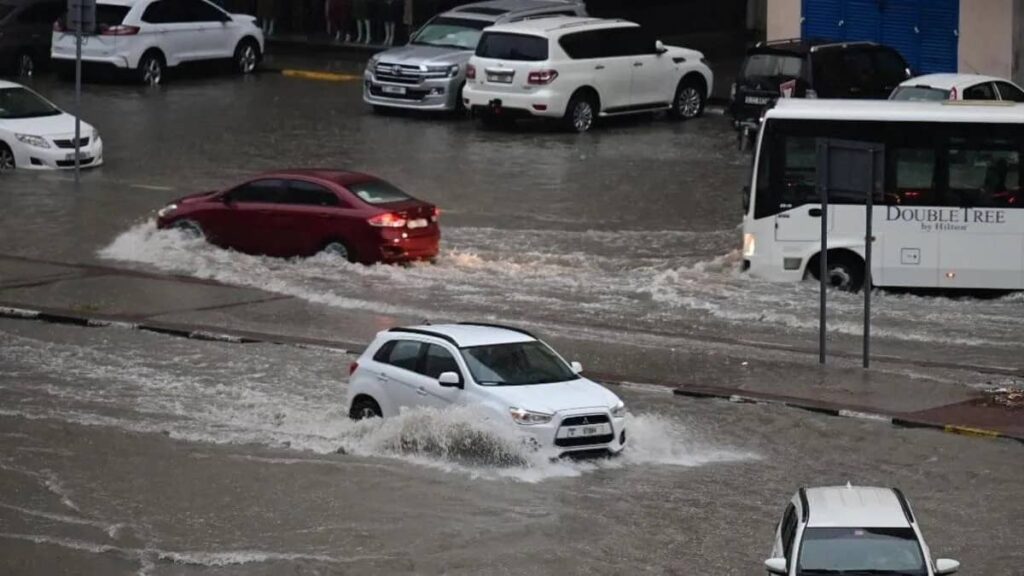Heavy rain and thunderstorms have swept across the UAE, making it imperative to prioritize safety amidst these adverse weather conditions. The National Center of Meteorology (NCM) has issued comprehensive guidelines to the people of the UAE, outlining precautionary measures to avert significant harm and mitigate the risks associated with heavy rainfall, floods, and thunderstorms.
Now, let’s explore how UAE residents can effectively safeguard themselves during such challenging circumstances.
Basic precautions to take before heavy rainfall or floods
Here are the best practices you should follow even before the weather conditions become extreme, according to the National Center of Meteorology (NCM):
- Stay informed about weather changes. Stay updated by listening to weather forecasts and official media for any notices or warnings.
- Conduct regular maintenance on electrical wiring to ensure it is in good condition and securely fixed.
- Inspect water sewerage channels and perform necessary maintenance to prevent any issues.
- Prepare first aid and emergency kits in advance. Always have alternative lighting options, such as a hand torch, lantern, or candles, readily available for use when needed.
- Keep children away from outdoor, open areas to ensure their safety during extreme weather conditions.
- Secure any items placed outdoors and store valuable belongings in waterproof containers. Additionally, remember to close windows to prevent any damage caused by strong winds or heavy rain.
By following these guidelines, you can better prepare yourself and your surroundings for extreme weather conditions.
Basic precautions to take during heavy rains, floods and thunderstorms
According to the National Center of Meteorology (NCM), if you are at home, it is important to follow these steps to ensure your safety:
- Stay informed: Keep a close eye on weather changes by regularly checking weather forecasts, official media updates, and verified social media accounts.
- Prevent water accumulation: Check water sewerage channels to minimize the risk of water accumulation in your surroundings.
- Protect your devices: Safeguard your home devices by disconnecting them from the power source. This precautionary measure will shield them from any electrical current that may surge through the home’s electrical network in the event of a lightning strike.
- Avoid contact with metal and water: Refrain from touching metallic objects or electrical devices during a thunderstorm. Additionally, avoid using water taps or any water connected to the plumbing system, as lightning can potentially strike the wires and pipes.
- Stay indoors: Unless there is a serious emergency, it is advisable not to leave the house during severe weather conditions.
- Seek shelter away from glass: Stay away from glass windows and doors to minimize the risk of injury from shattered glass in case of strong winds or flying debris.
- Keep children indoors: Ensure that children do not play outside the house during hazardous weather conditions.
- Follow evacuation orders: If you receive an evacuation order through the media or competent security authorities, promptly abide by the instructions and directions. Prioritize your safety and the safety of your family.
- Prepare for hurricanes: In the event of a hurricane, disconnect electrical current and close the water network to prevent any potential damage.
- Avoid showering during thunderstorms: To minimize the risk of lightning striking the plumbing connections, it is advisable to avoid showering as much as possible when thunder and lightning are present.
- Use phones safely: You may use mobile or landline phones indoors without any safety concerns.
- Wait for normal conditions: Before leaving the house, ensure that the situation has returned to normal. Stay
What should one do if he/she is from outside?
If you find yourself caught outside during a heavy rainfall or thunderstorm, it is crucial to take the following precautionary steps:
- Avoid seeking shelter under tall trees, electricity posts, or telecommunication posts. These structures can attract lightning and pose a significant risk to your safety.
- Refrain from walking along the shore or near flowing water, in valleys, or near dams or pools. These areas are prone to flash floods and can quickly become dangerous.
- Seek out a safe location and steer clear of electrical power sources during heavy rains. It is important to remember that even if an electrical power point has been disconnected, it does not guarantee complete safety.
- Be prepared with adequate firefighting tools and equipment, as lightning strikes can potentially ignite fires. Having the necessary tools on hand can help you respond swiftly and effectively in such situations.
- Limit the use of mobile phones, especially during thunderstorms. It is advisable to only use them in urgent cases. The electromagnetic waves emitted by mobile phones can attract lightning, putting you at risk.
- If you are in an open area, utilize a landline phone for emergencies. Keep in mind that both mobile and landline phones should only be used indoors, as they are not safe for outdoor use during thunderstorms.
- In the event of an electrical disconnection, do not attempt to reconnect the power yourself. Instead, seek assistance from competent authorities who can handle the situation safely and efficiently.
By following these precautionary measures, you can significantly reduce the risks associated with being caught outside during heavy rainfall or thunderstorms. Stay safe and prioritize your well-being above all else.
How to drive safely in the rain?
If you find yourself driving amid a torrential downpour, it is crucial to remember these valuable tips from NCM:
Stay vigilant by monitoring weather changes and tuning into weather forecasts on the radio.
Exercise caution and remain alert when encountering sudden weather shifts while on the road.
Reduce your speed and refrain from overtaking other vehicles, ensuring your lights are turned on.
Maintain a safe distance between your vehicle and others on the road.
Utilize your indicators solely for warning purposes and rely on both front and rear wipers to maintain optimal visibility.
If necessary, park your car safely off the road and contact your family to let them know you are secure.
